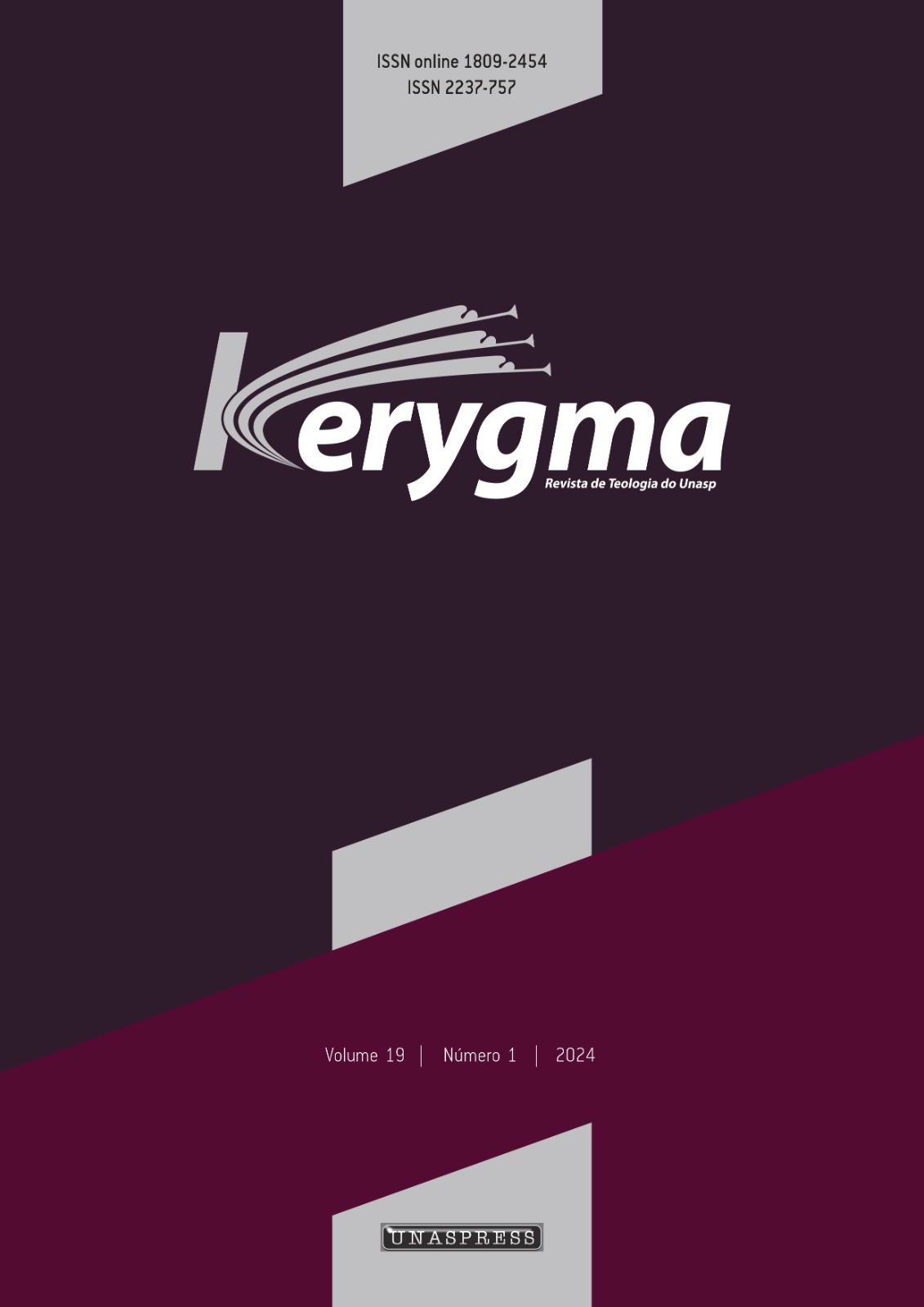Existentialism in Franz kafka and Qohelet: interface between literature and religion
DOI:
https://doi.org/10.19141/1809-2454.kerygma.v19.n1.pe1644Keywords:
Existentialism, The metamorphosis, Franz Kafka, Ecclesiastes, QoheletAbstract
This article delves into the interfaces between literature and religion by analyzing existentialism in two notable works: the biblical book of Ecclesiastes by Qohelet and "The Metamorphosis," by Franz Kafka. Despite being from different cultural and historical backgrounds, both works deeply explore the human condition, the absurdity of existence, and the search for meaning in a seemingly indifferent world. From an existentialist standpoint, the article examines how Qohelet and Kafka address themes such as alienation, anguish, and the transience of life. By drawing connections between the texts, the goal is to understand the importance of these themes in different time periods and demonstrate how literature and religion converge in expressing the most profound human concerns. In doing so, the study seeks to contribute to the scholarly debate on the interface between literature and existentialist philosophy, highlighting the resonances between biblical thought and Kafka's work.
Downloads
References
BARTON, J. Reading the Old Testament: method in biblical study. London: Darton, Longman and Todd, 1984.
BLAND, D. Proverbs, Ecclesiastes & Song of Songs. Joplin, MO: College Press, 2002. (The College Press NIV Commentary. Old Testament Series).
CARONE, Modesto. Lição de Kafka. São Paulo: Companhia das Letras, 2009.
CASTRO, J.; LEAL, J. Teologia do Qohelet: uma proposta. Último Andar, n. 30, p. 119–137, 2017. Disponível em: https://doi.org/10.23925/1980-8305.2017.i30p119-137. Acesso em: 01 dez. 2024.
CHILDS, B. Old Testament Theology in a Canonical Context. Philadelphia, PA: Fortress Press, 1985.
CRENSHAW, J. Book of Ecclesiastes. In: FREEDMAN, D. (ed.). The Anchor Bible Dictionary. New York: Doubleday, 1992. v. 2. p. 271-280.
DOUKHAN, J. Ecclesiastes: all is vanity. Nampa: Pacific Press, 2006.
ESCÓRCIO, D.; MONTEIRO, F. Reflexões sobre a filosofia existencialista. Cadernos Zygmunt Bauman, v. 11, n. 26, p. 15-26, 2021. Disponível em: https://periodicoseletronicos.ufma.br/index.php/bauman/article/view/17064/9592. Acesso em: 12 de ago. 2024.
FERREIRA, V. O Existencialismo é um Humanismo. 3. ed. [S. l.]: Presença, 1970. (Coleção Síntese).
FOX, M. Qohelet and His Contradictions. Decatur, GA: Almond, 1989.
FOX, M. The meaning of Hebel for Qohelet. Journal of Biblical Literature, v. 105, n. 3, p. 409–427, 1986.
GILES, T. História do existencialismo e da fenomenologia. São Paulo: EPU, 1989.
GORDIS, R. Koheleth - The Man and His World: a study of Ecclesiastes. 3 ed. New York: Schocken Books, 1968
GORSSEN, L. La cohérence de la conception de Dieu dans l’Ecclésiaste. Ephemerides Theologicae Lovanienses, v. 46, n. 3–4, p. 282–324, 1970.
HEIDEGGER, M. Ser e Tempo. Petrópolis: Vozes, 2005.
KAFKA, F. A Metamorfose. São Paulo: Lafonte, 2021.
KEEFER, A. Ecclesiastes and the Meaning of Life in the Ancient World. Cambridge, UK: Cambridge University Press, 2022.
MORGAN, J. Living in the tensions: Camus, Qohelet, and the confrontation with the absurd. 2011. Dissertação (Mestrado em Artes) - School of Communication, Liberty University, Lynchburg, 2011.
OTZEN, B. עָמָל. In: BOTTERWECK, J.; RINGGREN, H.; FABRY, H. J. (ed.). Theological Dictionary of the Old Testament. Grand Rapids, MI: Eerdmans, 2001. v. 11. p. 196-202.
PENHA, J. O que é Existencialismo. São Paulo: Brasiliense, 2001. (Coleção primeiros passos, n. 61).
SEOW, C. Ecclesiastes: a new translation with introduction and commentary. New Haven, CT: Yale University Press, 2008. (Anchor Yale Bible, v. 18C).
SEYBOLD, K. הֶבֶל. In: BOTTERWECK, J.; RINGGREN, H. (ed.). Theological Dictionary of the Old Testament. Grand Rapids, MI: Eerdmans, 1978. v. 3, p. 313-320.
SHUSTER, M. Being as breath, vapor as joy: using Martin Heidegger to re-read the book of Ecclesiastes. Journal for the Study of the Old Testament, v. 33, n.2, p. 219-244, 2008.
SUN, C. Ecclesiastes among the Megilloth: death as the interthematic link. Bulletin for Biblical Research, v. 27, n. 2, p. 185-206, 2017.
WATSON, F. Text, Church and World: biblical interpretation in theological perspective. Grand Rapids, MI: Eerdmans, 1994.
ZIMMERMAN, F. The Inner World of Qoheleth. New York: KTAV, 1973.
Downloads
Published
How to Cite
Issue
Section
License
Copyright (c) 2025 Kerygma

This work is licensed under a Creative Commons Attribution 4.0 International License.
Copyright Statement
In summary, authors who publish in Kerygma must agree that:
-
Once accepted for publication, the copyright of the articles is transferred to Kerygma.
-
All third-party materials used in the text must be properly referenced.
-
Authors must hold the rights or permissions for the use of images, tables, and other graphic materials.
-
Authors guarantee that the submitted manuscript is original, of their own authorship, and has not been submitted or published elsewhere.
-
The opinions and ideas expressed in the texts are the sole responsibility of the authors and do not necessarily reflect the views of the journal.
-
The editors reserve the right to make textual revisions and adjustments in accordance with the journal’s editorial standards.
-
Authors retain copyright and grant the journal the right of first publication, with the work licensed under the Creative Commons Attribution–NonCommercial 4.0 International License.
-
Authors authorize the reproduction and adaptation of the material by Kerygma, with the authors’ participation or express authorization when required.
-
The journal may distribute, store, archive, and make the articles available through any physical or digital means, whether free of charge or paid.
-
Authors may enter into separate agreements for the non-exclusive distribution of the published version of the work, provided that the original publication in Kerygma is acknowledged.
-
Full or partial reproduction of the texts in other publications requires prior written authorization from the editor.
-
Authors are permitted and encouraged to publish and distribute their work online (e.g., in institutional repositories or personal webpages) before or during the editorial process, as this may increase the visibility and citation impact of the published work.














